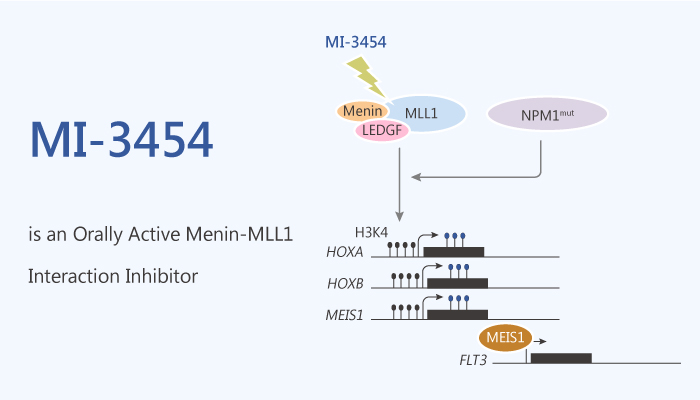The protein-protein interaction between menin and MLL fusion proteins plays a critical role in the pathogenesis of MLL leukemia. The genetic disruption of this interaction abrogates the development of acute leukemia in vivo. The menin-MLL1 wild-type interaction in acute myeloid leukemia (AML) with mutations in the nucleophosmin 1 (NPM1) gene is very important. Over 30% of AML patients has NPM1 mutations and are associated with the upregulated expression of HOXA, HOXB, and MEIS1 genes. Mutations in NPM1 co-occur with mutations in other AML driver oncogenes, such as FLT3 and/or DNMT3A. MI-3454 is a highly potent, very selective, and orally bioavailable inhibitor of the menin-MLL1 interaction, with an IC50 of 0.51 nM. It has a profound activity in leukemic cells and primary patient samples with MLL1 rearrangements or NPM1 mutations. It as a single agent induces complete remission or regression in the MLL1-rearranged and NPM1-mutated leukemia models.
MI-3454, as a menin-MLL1 interaction inhibitor, inhibits proliferation, induces differentiation, and complete remission or regression of leukemia in mouse models.

MI-3454 strongly reduces murine bone marrow cells transformed with MLL-AF9 or Hoxa9/Meis1 proliferation. It also leads to downregulated expression of HOXA9 and MEIS1 in Human leukemic cell lines MV-4-11 cells or MOLM13. Moreover, MI-3454 markedly reduces the viability of leukemic cells harboring various MLL fusion proteins (MLL-AF9, MLL-AF4, MLL-ENL), with GI50 values ranging from 7 to 27 nM. Furthermore, MI-3454 blocks the interaction of menin with an MLL14–43 fragment encompassing the entire menin binding motif.
In vitro, MI-3454 induces complete remission or regression of leukemia in mouse models of MLL1-rearranged or NPM1-mutated leukemia. It also sufficiently blocks leukemia progression by a once-daily treatment. Moreover, MI-3454 effectively blocks leukemia progression during the treatment period and markedly prolongs the survival of MOLM13 xenotransplantation model mice. In addition, it induces complete remission or blocks leukemia progression in patient-derived xenograft (PDX) models of MLL leukemia.
In summary, MI-3454 is an orally active, highly potent, and selective menin-MLL1 interaction inhibitor. It inhibits proliferation, induces differentiation and complete remission or regression of leukemia in mouse models through downregulation of key genes involved in leukemogenesis.
Reference:
Szymon Klossowski, et al. J Clin Invest. 2020 Feb 3;130(2):981-997.